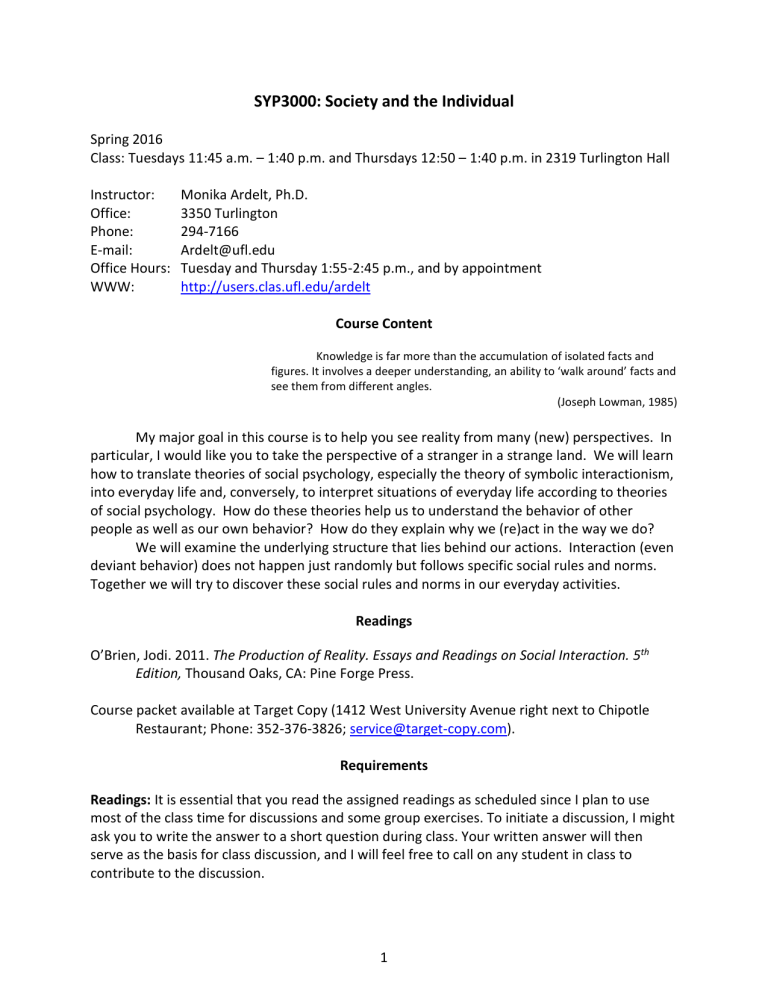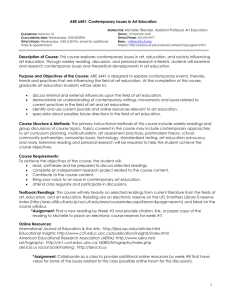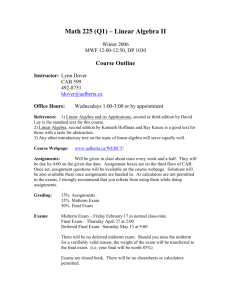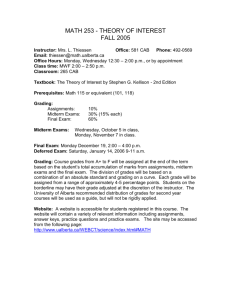syp3000: society and the individual - Sites
advertisement

SYP3000: Society and the Individual Spring 2016 Class: Tuesdays 11:45 a.m. – 1:40 p.m. and Thursdays 12:50 – 1:40 p.m. in 2319 Turlington Hall Instructor: Office: Phone: E-mail: Office Hours: WWW: Monika Ardelt, Ph.D. 3350 Turlington 294-7166 Ardelt@ufl.edu Tuesday and Thursday 1:55-2:45 p.m., and by appointment http://users.clas.ufl.edu/ardelt Course Content Knowledge is far more than the accumulation of isolated facts and figures. It involves a deeper understanding, an ability to ‘walk around’ facts and see them from different angles. (Joseph Lowman, 1985) My major goal in this course is to help you see reality from many (new) perspectives. In particular, I would like you to take the perspective of a stranger in a strange land. We will learn how to translate theories of social psychology, especially the theory of symbolic interactionism, into everyday life and, conversely, to interpret situations of everyday life according to theories of social psychology. How do these theories help us to understand the behavior of other people as well as our own behavior? How do they explain why we (re)act in the way we do? We will examine the underlying structure that lies behind our actions. Interaction (even deviant behavior) does not happen just randomly but follows specific social rules and norms. Together we will try to discover these social rules and norms in our everyday activities. Readings O’Brien, Jodi. 2011. The Production of Reality. Essays and Readings on Social Interaction. 5th Edition, Thousand Oaks, CA: Pine Forge Press. Course packet available at Target Copy (1412 West University Avenue right next to Chipotle Restaurant; Phone: 352-376-3826; service@target-copy.com). Requirements Readings: It is essential that you read the assigned readings as scheduled since I plan to use most of the class time for discussions and some group exercises. To initiate a discussion, I might ask you to write the answer to a short question during class. Your written answer will then serve as the basis for class discussion, and I will feel free to call on any student in class to contribute to the discussion. 1 Reading Quizzes. Reading quizzes will be available in e-Learning under “Quizzes” after we have finished with the last topic. You will be able to take the quiz until 1 hour before class starts on the day when the reading quiz is due. Each quiz consists of 5 questions from the assigned readings and is worth 1 point. There are a total of 10 reading quizzes, but I will drop your 2 lowest grades to calculate your overall reading quiz grade worth 8% of your final grade. The questions should be easy to answer if you have read the assigned material. You will have one attempt and 5 minutes to take each quiz. Attendance and Class Participation: Attendance of class is required because non-attendance by several students at a time will destroy the dynamics of the class. You will be allowed two absences without any questions. After that, any unexcused absence will result in a half point reduction of your attendance and class participation grade. To receive the full 6 points of the class participation grade, you will need to attend class and participate regularly in class discussions. If you never or rarely participate, you cannot earn more than 3 of the 6 points even if you do not miss class. Tardiness: If you arrive late to class, you will be marked as “absent.” In this case, it is your responsibility to let me know at the end of the class that you were actually present. Otherwise, I will count your tardiness as absent from class. Two unexcused late arrivals to class will be recorded as one absence. Use of Electronic Devices: I request that you do NOT use any electronic devices, such as a laptop or cell phone, that might distract you during class. Even if you use a laptop for notetaking, the temptation will be too strong to go on the internet and leave the classroom mentally. Assignments: Almost every week, I will give you a 600-word written assignment that you should submit to me via E-Learning before class on or before the designated due date. For general information about e-Learning in Canvas visit https://wiki.helpdesk.ufl.edu/FAQs/E-Learning. The written assignments must be submitted either as a Word document (*.doc or *.docx) or saved and submitted as a rich text format (*.rtf) file. I will not be able to download, read, and grade any other file format. Each 600-word assignment is worth 2 points. To get full credit, you need to submit at least 600 words of text that pertain to the assignment (names and headings do not count). There are a total of 12 assignments. Six of the assignments (or the first 12 points you will earn) are required and will count as 12% of your grade. Six additional assignments are optional. You have the option to substitute five of the additional assignments (or up to 10 points above your initial 12 points) for 10% of the average grade of your three exams. Except for the first two assignments, I will not accept any late entries regardless of the excuse. However, if you submit all 12 written assignments, you can earn up to 2 extra credit points that will be added to your total score at the end of the semester. For general information about e-Learning in Canvas visit https://wiki.helpdesk.ufl.edu/FAQs/E-Learning. 2 To submit your MS Word file or *.rtf file in e-Learning, go to the University of Florida e-Learning Support Services home page at http://elearning.ufl.edu (bookmark this page). To sign into eLearning in Canvas, click on the “e-Learning in Canvas” link using your assigned Gatorlink username and password. If you do not have a Gatorlink ID or if you cannot remember your Gatorlink login information, go to the Gatorlink website at <http://gatorlink.ufl.edu> or to the CIRCA Help Desk in the Hub (phone: 392-HELP) for assistance. After you have successfully logged into e-Learning, you will be taken to your Dashboard, which will help you to navigate through Canvas. For further assistance please contact e-Learning Support Services at (352) 392-4357 or email: learning-support@ufl.edu To submit an assignment entry via e-Learning, navigate to our course and click on Assignments in the menubar. Assignments can be displayed in the order they are due or by type. Do the following to submit an assignment: Step 1: Click the assignment you want to submit. Step 2: Click on the “Submit Assignment” link. Step 3: To upload your file, click the Choose File button. Browse for a file to upload. Step 4: Check “This assignment submission is my own, original work” Step 5: Click Submit Assignment when you are done. After you have submitted your work, you will see information in the Sidebar about your submission. If you choose, you may resubmit another version of your assignment before the deadline using the Re-submit Assignment link. To view your grades, click on Grades in the menubar. Note: The writing in this class will NOT count toward the 24,000 word writing requirement. Cheating: I define copying parts or all of an assignment or exam from an author or another student or allowing another student to copy parts or all of your assignment or exam as cheating. You are also not allowed to use any electronic devices (e.g., cell phones) during exams. WARNING: Students who are caught cheating in this way will fail the class immediately! UF students are bound by The Honor Pledge which states, “We, the members of the University of Florida community, pledge to hold ourselves and our peers to the highest standards of honor and integrity by abiding by the Honor Code. On all work submitted for credit by students at the University of Florida, the following pledge is either required or implied: “On my honor, I have neither given nor received unauthorized aid in doing this assignment.” The Honor Code (http://www.dso.ufl.edu/sccr/process/student-conduct-honor-code/) specifies a number of behaviors that are in violation of this code and the possible sanctions. Exams: There are three exams, two midterm exams on February 11 and March 10 during regular class time and the final exam on April 26 (at 8 a.m.!). Please note that the final exam date and time are assigned by the university and that you will not be able to take the final 3 exam early. All exams will consist of multiple choice questions. The exams will be based on the readings as well as on material from class, including class discussions. The exams will not be comprehensive, that is, they will cover only material presented in class or in the readings that were not covered by the previous exam(s). I do not plan to give any make-up exams. So if you should encounter any difficulties, come and see me early! Accommodations for Students with Disabilities: Students with disabilities requesting accommodations should first register with the Disability Resource Center (352-392-8565, www.dso.ufl.edu/drc/) by providing appropriate documentation. Once registered, students will receive an accommodation letter which must be presented to the instructor when requesting accommodations. Students with disabilities should follow this procedure as early as possible in the semester. Three Tips for Staying Awake in Class (and make class more interesting to you): 1. Ask questions. 2. If you feel yourself falling asleep, ask provocative questions. Challenge your professor. 3. Read the assigned material before class to do #1 and #2. Grading OPTION 1 Requirements Reading Quizzes First Midterm Second Midterm Final Exam Attendance and class participation Six 600-word assignments (required) Additional (up to five) 600-word assignments OPTION 2 % of Final Grade 8% 18% 18% 28% 6% 12% 10% Requirements Reading Quizzes First Midterm Second Midterm Final Exam Attendance and participation Six 600-word assignments % of Final Grade 8.00% 21.33% 21.33% 31.34% 6.00% 12.00% Your grade will be calculated according to the formula of either Option 1 or Option 2, whichever results in a higher grade for you. Plus you can earn up to 2 extra credit points under Option 1 (but not Option 2), which will be added to your total score if you complete all 12 written assignments! I will not grade on a curve, i.e. your grade will depend on your absolute performance, not your performance compared to other students. 4 The points that you will earn can be translated into letter-grades as follows: 92.5 - 100.0 = A 90.0 - <92.5 = A87.5 - <90.0 = B+ 82.5 - <87.5 = B 80.0 - <82.5 = B77.5 - <80.0 = C+ 72.5 - <77.5 = C 70.0 - <72.5 = C67.5 - <70.0 = D+ 62.5 - <67.5 = D 60.0 - <62.5 = D<60.0 = E For information on current UF grading policies for assigning grade points, see https://catalog.ufl.edu/ugrad/current/regulations/info/grades.aspx Requirements for class attendance and make-up exams, assignments, and other work in this course are consistent with university policies that can be found in the online catalog at: https://catalog.ufl.edu/ugrad/current/regulations/info/attendance.aspx Students are expected to provide feedback on the quality of instruction in this course based on 10 criteria. These evaluations are conducted online at https://evaluations.ufl.edu. Evaluations are typically open during the last two or three weeks of the semester, but students will be given specific times when they are open. Summary results of these assessments are available to students at https://evaluations.ufl.edu/results. A WORD OF CAUTION: Keep in mind that the points you earn during the semester will determine your final grade. All assignments must be submitted by the due date and cannot be turned in after the end of the semester to improve your grade. Your actual total points at the end of the class will determine your grade. I will not round up points. Begging will be futile! Important phone numbers and contact information University counseling services and mental health services: 392-1575 or http://www.counseling.ufl.edu/cwc/Default.aspx University Police Department: 392-1111 or 9-1-1 for emergencies 5 Tentative Class Schedule Date Topic Readings 01/05 – 01/07 What is real? 01/07 Assignment 1 due! O’Brien: pp.1-10, Readings (1)*, 2-3; e-Learning → Modules: Body ritual among the Nacirema 01/07 Reading Quizz 1 due! 01/12 – 01/14 Perspectives in social psychology 01/14 Assignment 2 due! O’Brien: Reading 4 01/19 Wisdom and knowledge 01/19 Assignment 3 due! 01/21– 02/02 Socialization and language 01/28 Assignment 4 due! O’Brien: pp.49-62, Readings (5), 6-7, 17 01/21 Reading Quizz 2 due! 02/04 – 02/09 Cognitive structure and social structure 02/09 Assignment 5 due! O’Brien: pp.63-70, Readings 8, (9), 10 02/04 Reading Quizz 3 due! 02/11 First Midterm! 02/16 Naming as an interactional process 02/16 Assignment 6 due! O’Brien: pp.173-188, Readings 18, 20, (21) 02/16 Reading Quizz 4 due! 02/18 – 02/23 Definition of the situation 02/25 Assignment 7 due! O’Brien: pp.249-261, Readings 22-23, (24), 25-27, (28), 40; e-Learning → Modules:Black men and public space; 02/23 Reading Quizz 5 due! 02/25 – 03/08 Self-concept and social identity 03/08 Assignment 8 due! O’Brien: pp. 107-120, Readings 11-13, 15, (16) 03/08 Reading Quizz 6 due! 03/01 – 03/03 SPRING BREAK! 03/10 Second Midterm! 03/15 – 03/17 A theory of reality 03/17 Assignment 9 due! O’Brien: pp.337-349, Readings 29-31 03/15 Reading Quizz 7 due! 03/22 – 03/24 Self-fulfilling prophecies 03/24 Assignment 10 due! O’Brien: pp.349-352, Readings 32-33; e-Learning → Modules: On being sane in insane places; Pygmalion in the classroom 03/22 Reading Quizz 8 due! 03/29 – 04/07 Conflict in self-production 04/05 Assignment 11 due! O’Brien: pp.453-469, Readings 14, (19, 36), 37-39 03/29 Reading Quizz 9 due! 04/12 – 04/19 Conflict in cultural production 04/14 Assignment 12 due! O’Brien: pp.352-358, 469-471, Readings 34, (35), 41-42; e-Learning → Modules: Collateral Language 04/12 Reading Quizz 10 due! 04/26 Final Exam (8:00 – 9:30 a.m.) *Optional readings are given in parentheses. 6








